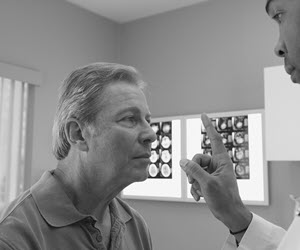Vision Therapy Can Change Your Life…
- Amblyopia (Lazy eye)
- Eye alignment problems
- Eye focus problems
- Blurred Vision
- Binocular Vision
- Computer Vision Syndrome
- Eye Tracking Issues
- Convergence Insufficiency
- Hand-eye coordination problems
- Binocular Vision
- Double vision
- Depth Perception Problems
- Traumatic Brain Injury
- Strabismus (Crossed Eye)

You may be experiencing a vision problem due to previous accidents or injury – or you may be experiencing declining visual performance due to the natural aging process. The good news is that in many cases, visual performance can be improved with a vision therapy program – complete with vision therapy eye exercises.
Vision Therapy Research Study:
Older Adults Can Improve Visual Performance
According to Journal of Vision in November, 2010, confirms that vision therapy for adults is effective. Perceptual training (including vision therapy) can improve visual performance among older adults and the elderly. The study used an experimental group and a control group. The experimental group showed significant improvement while the control group experienced no improvement.
Meet Dr. Laura Knapp - Vision Therapy Specialist

How Vision Therapy for Adults Works
1) Office Evaluation and Eye Exam
A comprehensive in office evaluation will be conducted with our eye doctor Dr. Knapp and her eye care team so that we can understand you, your history, and the current difficulties that you are experiencing. This evaluation includes a thorough eye exam to evaluate your overall eye health. You’ll get a chance to discuss any vision issue that you’re currently experiencing.
2) Your Unique Customized Program
If it is determined that Vision Therapy is right for you, a custom vision rehabilitation program will be developed based on the results of standardized tests, your needs, and your symptoms.
3) Your Vision Therapy Sessions Begin
Your Vision Therapy Sessions will be conducted by a vision therapist:
- Typically 6-12 months
- 1-2 office visits per week at our vision therapy center
- 30-60 minutes per visit
- Vision Therapy Exercises to work on at home between in office vision therapy work
As an example, some patients will undergo vision training to improve overall eye movement. This might include exercises to improve eye teaming which is designed to get your eyes to work better in a more coordinated fashion.
Your treatment plan is designed to mitigate and in some cases eliminate the symptoms of the vision disorder which you’re currently suffering from.
What You Can Expect: Improved Vision and Better Eye Coordination
At the end of treatment, Vision Therapy allows you to develop efficient visual skills and processing as well as improved visual acuity. As a result, it can effectively treat a number of eye problems (including problems with lazy eye, binocular vision, eye focusing, and even double vision).
Vision Therapy Eye Exercises = Physical Therapy for your Eyes!
The Science Behind Vision Therapy
Individualized and Customized Vision Therapy Program
The science of therapy has established that to be maximally effective, therapy should be individualized and customized to the needs of the patient. Vision therapy may be implemented by a trained therapist, but must be administered under the supervision and guidance of a knowledgeable Doctor of Optometry. The patient must internalize changes and understand that the visual system is modified therapeutically, not by procedures done to the patient, rather to the extent the patient is responsible for viewing differently.
Technology has greatly aided the science of optometric vision therapy but placing the patient in front a computer cannot substitute for active observation and interaction with a therapist. In the next section we review research on vision therapy, but there is one major study that is crucial in understanding the science of vision therapy.
The CITT, or Convergence Insufficiency Treatment Trial, is a multicenter study funded by the National Institutes of Health (the original study name was CIRS, or Convergence Insufficiency and Reading Study). The group that created this study went on to publish the CISS, or Convergence Insufficiency Symptom Survey, to prove that pencil push-up therapy or base-in prism glasses used in isolation were NOT effective, and that home-alone therapy was equivalent to placebo therapy. This is where the science becomes pivotal. Anyone currently treating convergence insufficiency without the benefit of supplemental in-office procedures is essentially dispensing placebo therapy until proven otherwise.
Office-Based Vision Therapy is Far Superior to any Other Form of Intervention
The results of this study are now being used by some insurance carriers to support the need for office-based vision therapy, but only of 12 weeks duration, as was used in the CITT study.
Vision Therapy Blog
For more information, contact us, or see the latest finding on our vision therapy blog.
We also have vision therapy success stories available for you to review.












